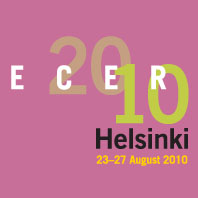Session A:
Prof Gunilla Holm and Prof Yen Yen Woo
University of Helsinki and Long Island University
Invited Lecture, Abstract:
Visual (Re)presentation of Data / (Re)presenting Research in Visual Forms
Visual images are part of our everyday lives, but they are not often part of our research data and dissemination of results. Professors Holm and Woo will based on their experience with using photography and film in qualitative research, discuss the following issues:
- Learning a visual language to work with visual data
- Collecting and interpreting visual data
- Interpreting and constructing space in the visual image
- Considering the audience and the author in the presentation of visual data
Professor Gunilla Holm will speak from her experience of collecting, interpreting and presenting photographs taken by research participants. Professor Yen Yen Woo will talk about her experience translating her interview research into film.
Session E: Two Parallel Keynotes
Dr Päivi Honkatukia
Finnish Youth Research Society
Invited Lecture, Abstract
'Sensitive issues as ethical issues: studying ethnic minority young men in prison
In the presentation I will think over ethical dimensions related to a research project I have been involved in couple of years ago. The project dealt with criminality in the life course of young men with an immigrant or Roma background, and I conducted it together with Leena Suurpää. The empirical material consisted of narrative interviews of young men who had committed crimes (some were in prison), as well as interviews with professionals, NGO activists and civil cervants working with immigrant youth.
I will particularly ponder ethical challenges and dilemmas related to an attempt to understand research participants who are in a marginal position in a society. The topic of the project is sensitive in many ways: besides being a labelled group in many ways, the young immigrant males are overrepresented in the criminal statistics. We attempted to reach behind the statistics - to the subjective meanings of crimes and criminality in young men's everyday lives. Different phases of the research project included ethical aspects and dilemmas: they were visible in the process of selecting the topic and framework for the study as well as its central concepts, in recruiting the interviewees, in interview interaction as well as in writing up the research report. They are presented and analysed in the presentation.
Thus, the past research project will be documented from the perspective of research ethics.'
Dr Shosh Leshem and Prof Dr Vernon Trafford
Oranim Academic College of Education, Israel
and Anglia Ruskin University, United Kingdom
Invited Lecture, Abstract
What Do Examiners Look for in Doctoral Theses/Dissertations?
Evidence suggests that candidates in many countries are unclear of the criteria that examiners use to judge the scholarly merit of their submitted thesis/dissertation. This affects the way in which they write their thesis/dissertation, prepare to defend it and defend it.
Our research illuminates this situation. Data from, currently, 114 doctoral defences provide insights on the type of questions that examiners ask, the relative importance of those questions and the significance of categories of questions. These data provide frameworks of questions and issues that candidates can use to guide and shape the planning and drafting of their thesis/dissertation. In this way, candidates can align their doctoral study, personal scholarship and writing to accord with the summative expectations of their examiners.
The presentation will draw on our extensive research, numerous publications, international workshops for candidates and doctoral supervisors plus our experience as supervisors and examiners. In this workshop participants will discuss issues from their own theses and identify critical issues that examiners look for when they assess a doctoral thesis. Our data provide frameworks of questions and issues that candidates can use to guide and shape the planning and drafting of their thesis/dissertation. In this way, they can align their doctoral study, personal scholarship and writing to meet the summative expectations of their examiners.
This session will contain three parts:
- Theoretical: presentation on the predictable ~ types of ~ questions asked by examiners of candidates in doctoral defense / vivas;
- Practical: small group activity relating examiners’ questions to how theses/dissertations are ‘being drafted’ by participants;
- Putting it together: a feedback plenary to identify how anticipating likely questions and possible answers can be used to improve the scholarly quality of submitted theses/dissertations.
